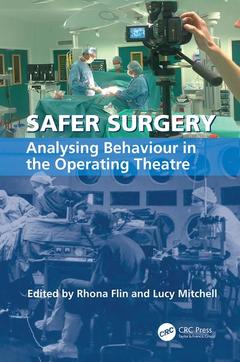Safer Surgery Analysing Behaviour in the Operating Theatre
Coordonnateurs : Mitchell Lucy, Flin Rhona

Rhona Flin (BSc, PhD Psychology) is Professor of Applied Psychology at the University of Aberdeen. She is a Chartered Psychologist, a Fellow of the British Psychological Society and the Royal Society of Edinburgh. She directs a team of psychologists working with high-risk industries on research and consultancy projects concerned with the management of safety and emergency response. She is currently leading the Scottish Patient Safety Research Network and has been working with anaesthetists and surgeons since 1999. Her books include Sitting in the Hot Seat: Leaders and Teams for Critical Incident Management (Wiley, 1996), Managing the Offshore Installation Workforce (edited with Slaven, PennWell Books, 1996), Decision Making Under Stress (edited with Salas, Strub & Martin, Ashgate, 1997), Incident Command: Tales from the Hot Seat (edited with Arbuthnot, Ashgate 2002) and Safety at the Sharp End: A Guide to Non-Technical Skills (with O'Connor & Crichton, Ashgate, 2008). Lucy Mitchell (MA, MRes Psychology) is a Research Assistant at the Industrial Psychology Research Centre at the University of Aberdeen. She is currently developing a framework for assessing and training operating theatre scrub practitioners' non-technical skills and is also working towards a PhD in this area. She is a former police officer and has previously investigated the decision-making skills of police firearms officers.
Date de parution : 04-2017
15.6x23.4 cm
Date de parution : 09-2009
Ouvrage de 500 p.
15.6x23.4 cm
Thèmes de Safer Surgery :
Mots-clés :
Non-Technical Skills; patient; CanMEDS Model; safety; Simulation Based Team Training; situation; Shared Mental Models; awareness; Nontechnical Skills; surgical; Crew Resource Management Training; team; Non-technical Skills Training; crew; Surgical Researchers; resource; Common Language; management; Behavioural Marker System; operating; CRM; anaesthetic practice; Scrub Nurse; theatre nurses' task performance; Behavioural Markers; operating theatre team's behaviour; Literature Review; Adaptive Coordination; Paediatric Cardiac Surgery; Implicit Coordination; Clinical Practice; Operating Theatre Team; Situation Awareness; Coordination Behaviour; TKR Revision; Event Base Pm Task; Heedful Interrelating; Pm Task



